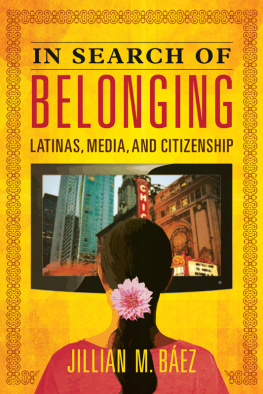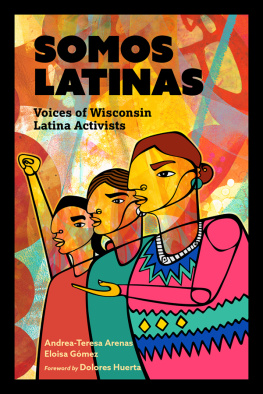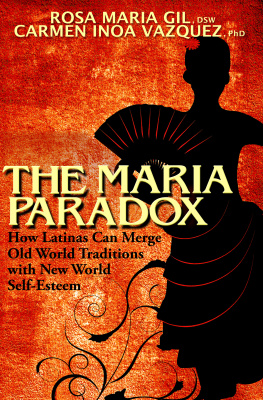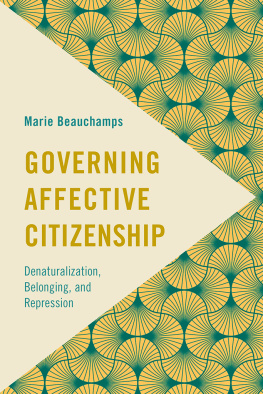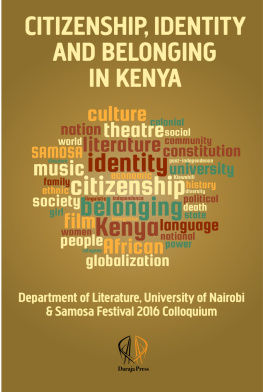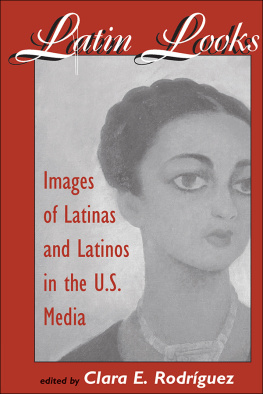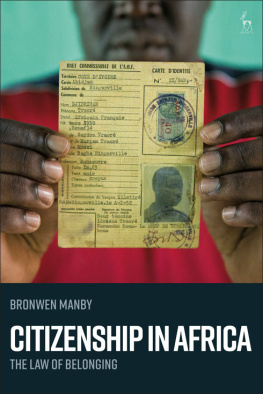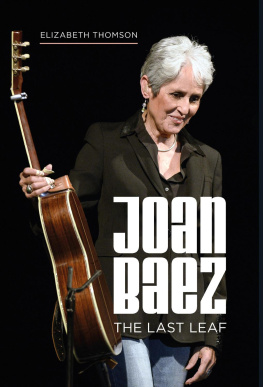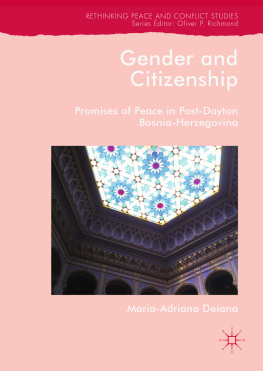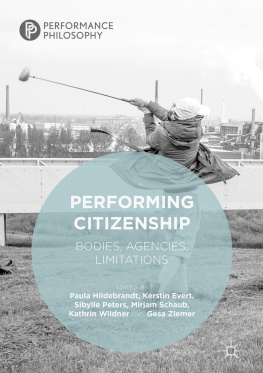Baez - In Search of Belonging: Latinas, Media, and Citizenship
Here you can read online Baez - In Search of Belonging: Latinas, Media, and Citizenship full text of the book (entire story) in english for free. Download pdf and epub, get meaning, cover and reviews about this ebook. year: 2018, publisher: University of Illinois Press, genre: Home and family. Description of the work, (preface) as well as reviews are available. Best literature library LitArk.com created for fans of good reading and offers a wide selection of genres:
Romance novel
Science fiction
Adventure
Detective
Science
History
Home and family
Prose
Art
Politics
Computer
Non-fiction
Religion
Business
Children
Humor
Choose a favorite category and find really read worthwhile books. Enjoy immersion in the world of imagination, feel the emotions of the characters or learn something new for yourself, make an fascinating discovery.
- Book:In Search of Belonging: Latinas, Media, and Citizenship
- Author:
- Publisher:University of Illinois Press
- Genre:
- Year:2018
- Rating:4 / 5
- Favourites:Add to favourites
- Your mark:
- 80
- 1
- 2
- 3
- 4
- 5
In Search of Belonging: Latinas, Media, and Citizenship: summary, description and annotation
We offer to read an annotation, description, summary or preface (depends on what the author of the book "In Search of Belonging: Latinas, Media, and Citizenship" wrote himself). If you haven't found the necessary information about the book — write in the comments, we will try to find it.
Baez: author's other books
Who wrote In Search of Belonging: Latinas, Media, and Citizenship? Find out the surname, the name of the author of the book and a list of all author's works by series.
In Search of Belonging: Latinas, Media, and Citizenship — read online for free the complete book (whole text) full work
Below is the text of the book, divided by pages. System saving the place of the last page read, allows you to conveniently read the book "In Search of Belonging: Latinas, Media, and Citizenship" online for free, without having to search again every time where you left off. Put a bookmark, and you can go to the page where you finished reading at any time.
Font size:
Interval:
Bookmark:

In Search of Belonging
LATINOS IN CHICAGO AND THE MIDWEST
Series Editor
Frances R. Aparicio, Northwestern University
Latinas, Media, and Citizenship
JILLIAN M. BEZ

2018 by the Board of Trustees
of the University of Illinois
All rights reserved
Cataloging data available from the Library of Congress
ISBN 978-0-252-041792 (cloth : alk.)
ISBN 978-0-252-041792 (paper : alk.)
ISBN 978-0-252-050466 (ebook)
In loving memory of my
grandmother Ramonita Chaparro
Scholarship is not written in isolation, and this book is no exception. I have had the support of many mentors, colleagues, family members, and friends. I want to begin by acknowledging my academic mentors for providing me with consejos throughout this project. I thank Federico Subervi for generously introducing me to the field of Latina/o media studies when I was a budding scholar finishing my undergraduate degree at Hunter College. I am indebted to Angharad N. Valdivia for her commitment to my intellectual growth and her confidence in this project from its inception to completion. Her dedication to cultivating young scholars in the field is amazing. Frances Aparicio also provided much-needed wisdom during my time as a graduate student, and later as a junior faculty member. She has played a central role in this books development and publication. Arlene Dvila has tirelessly supported this project and provided numerous opportunities to make my work more visible both in the academy and outside it. Lastly, I thank Mari Castaeda for teaching me so much about how to successfully navigate the academy as a Latina mam and for graciously collaborating with me on several projects.
Very special thanks go to Mara Elena Cepeda for her continuous support throughout my career. Her confidence in the merits of my scholarship gave me the motivation to complete the book. I am deeply gratefully for her generous feedback on an early version of the manuscript. I also thank Mrida Ra for making suggestions for revision. Carmen Whalens and Arlene Torress sage advice on publishing was also much appreciated.
There were numerous colleagues who provided feedback on various parts of the manuscript. I first wish to thank the anonymous readers. Your suggestions helped me craft a much stronger argument that more assertively articulates my contribution to the field. I also thank Vincent Pham, Myra Washington, and the participants in CUNYs Faculty Fellowship Publication Program. Thanks to Ana Yolanda Ramos-Zayas for inviting me to the Whiteness in the Americas working group, which also provided useful feedback on early chapters. While I was a postdoc at the University of Michigan, Phillip Bowman, Susan Douglas, Larry LaFountain-Stokes, Amanda Lotz, Robin Means Coleman, and Maria Cotera also offered advice on the book publication process. Lastly, I thank Isabel Molina-Guzmn, Cameron McCarthy, and Lisa Cacho for their advice during the very early stages of the project.
My thinking has also been informed by a number of scholars who provided important dialogue whenever we met or I read their work. Some of these intellectuals include Dolores Ins Casillas, Mary Beltrn, Juan Pion, Lucila Vargas, Hector Amaya, Diana Rios, Yeidy Rivero, Manuel Avils-Santiago, Lori Kido Lopez, Radhika Parameswaran, and Roopali Mukherjee. I also thank my colleagues at the College of Staten IslandDavid Gerstner, Cynthia Chris, Christopher Anderson, Bilge Yesil, Cindy Wong, Edward Miller, Ying Zhu, Sherry Millner, Tara Mateik, Valerie Tevere, Michael Mandiberg, Reece Peck, Bang-Geul Han, Dalia Kandiyoti, Matt Brim, Ismael Garca-Coln, John Lawrence, George Sanchez, and Alyson Bardsley. A very special thank you to Racquel Gates for walking with me through each step toward publication. For their publishing and scholarly support, I also thank Annie Martin and Dawn Durante.
I received generous funding for this project from the University of Illinois at Urbana-Champaign Graduate College, the Ford Foundation, the Mellon Mays Undergraduate Foundation, the Center for Puerto Rican Studies (CENTRO) at Hunter College, the Center for Citizenship, Race, and Ethnicity Studies (CREST) at the College of Saint Rose, the National Center for Institutional Diversity at the University of Michigan, and the Research Grants from my unionthe Professional Staff Congress. Without such generous support, the book would not have been completed. The Office of the Dean of Humanities and Social Sciences at the College of Staten Island also provided funding for research assistance. I thank Lovette Rosado, Lauren Neglia, and Frank Foresta for their assistance in preparing the manuscript.
I am also grateful to a number of scholars working in or on Latina/o Chicago who welcomed me to the field, exposed me to the local culture and history, and introduced me to many of the people who took part in this study. Thank you to Marisa Alicea, Lorena Garcia, Mrida Ra, Angelica Rivera, Isaura Pulido, Tina Pacione-Zayas, Mirelsie Velzquez, and Lilia Fernndez. I am also indebted to the participants for inviting me into their homes, jobs, and leisure spaces to share their thoughts with me. Without these women, the project would not be possible.
I was very fortunate to have close friends in academia who graciously provided much-needed comic relief and emotional support throughout the research and writing process. Thank you to Natalie Havlin, Aisha Durham, Celiany Rivera-Velzquez, Lilia Fernndez, Michelle Rivera, Jennifer Domino Rudolph, Marilisa Jimenez, Carolyn Randolph, Uma Jayakumar, Himika Bhattacharya, and Amy Hasinoff. A very special thanks to my writing buddy Rachel Afi Quinn, who walked through this process with me almost daily for over six years.
I give special thanks to my family and friends for sticking with me throughout the process. A very warm thank you to Antonia Chaparro, Pedro Bez Jr., Pedro Bez III, Nicholas Bez, Elias Bez, Elizabeth Chaparro, Luz Bez, Joshua Santana, Evita Giron, and Maria Rodriguez.
Lastly, and most importantly, I thank Eric Paul and Lucas Paul-Bez for providing the emotional support and writing space and time necessary to sustain this long-term project. I cant imagine having finished the book without them. Los quiero mucho .
In Search of Belonging
As a child, I must have watched the Academy Awardwinning musical West Side Story (1961) fifty times. A modern Romeo and Juliet tale, the film recounts the tensions between Puerto Rican and ethnic white gangs on the West Side of Manhattan. My family would sit in front of the television to watch West Side Story every time it aired, noting that it was the only Hollywood movie about Puerto Ricans on the U.S. mainland. My mother was careful to point out that one of the supporting actresses, Rita Moreno, who played Anita, was Puerto Rican. At the same time, my father stressed that the discrimination toward Puerto Ricans displayed in the film was reflective of the prejudices he had experienced as a Puerto Rican migrant to New York City. My parents used West Side Story as an instructional tool, in that it offered a Puerto Rican role model and provided a springboard for discussing the history of discrimination toward Puerto Ricans in New York City. While West Side Story offers very limited, problematic representations of Puerto Ricansparticularly of women, who are depicted as either virginal or spitfiresit is nonetheless an iconic film for Puerto Ricans. On the one hand, West Side Story filled a gap in entertainment media, where Puerto Ricans were seldom represented. On the other hand, it served as the template through which nonPuerto Ricans made sense of Puerto Ricans, particularly in the 1960s and 1970s, when few cinematic representations of Puerto Ricans were in circulation.
Font size:
Interval:
Bookmark:
Similar books «In Search of Belonging: Latinas, Media, and Citizenship»
Look at similar books to In Search of Belonging: Latinas, Media, and Citizenship. We have selected literature similar in name and meaning in the hope of providing readers with more options to find new, interesting, not yet read works.
Discussion, reviews of the book In Search of Belonging: Latinas, Media, and Citizenship and just readers' own opinions. Leave your comments, write what you think about the work, its meaning or the main characters. Specify what exactly you liked and what you didn't like, and why you think so.

